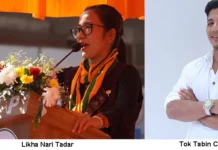Flights Of Fantasy
[ M Panging Pao ]
Recently, India celebrated the 75th Republic Day with pomp and gaiety. Traditionally, Republic Day is celebrated across Arunachal Pradesh with fervour and enthusiasm.
Republic Day marks the adoption of the Constitution of India, which was officially adopted on 26 January, 1950. This replaced the Government of India Act, 1935 as the governing document of India, thus turning the nation into a republic separate from British rule. The Constitution was adopted by the Indian Constituent Assembly on 26 November, 1949, and came into effect on 26 January, 1950.
Oxford defines ‘republic’ as a state in which supreme power is held by the people and their elected representatives, and which has an elected or nominated president, rather than a monarch.
Many consider the Indian Constitution one of the finest constitutions of the world. The Indian Constitution bestows on its citizens rights like social, economic, political justice; liberty of thought, expression, belief, faith & worship; equality of status and opportunity and fraternity assuring the dignity of the individual and the unity and integrity of the nation.
Most would agree that in most cases the republic of India gives her citizens many values and ideals that are enshrined in the Constitution of India. However, like any other institution, there are a few challenges to overcome and gaps to plug. Readers will agree that cases of discrimination based on caste, race, colour and religion are still reported from different places.
Likewise, cases of economic deprivation are also seen; the gap between the haves and the have-nots is increasing year after year. Similarly, there are incidents of political discrimination and denial of political rights. Some leaders and parties exploit religious/caste divisions for electoral benefits, etc.
Despite its complexities and contradictions, as Indian citizens, if we ask ourselves, “Do you get justice?” the answer would be “Yes, mostly….”
If we ask, “Do you have liberty of thought, expression, belief, faith and worship?” the answer would be ‘Yes mostly….”
If we ask, “Do you have equality of status and opportunity?” the answer would be “Yes mostly….”
If we ask, “Are you allowed to choose your elected representatives and government by voting?” the answer would be yes.
On the occasion of the 74th Republic Day, what remains for us as a nation is to plug the gaps and overcome the remaining challenges.
If the Indian Constitution gives us these universal rights and ideals, should citizens also have duties and responsibilities?
We keep asking what the Centre or the state or the government has done for us. The time has come to ask ourselves, “What have we given back our nation?”
Belonging to a sovereign, socialist, secular and democratic republic that guarantees lofty ideals like justice, liberty and equality to all citizens, as citizens, shouldn’t we also be responsible, dutiful, lawful and patriotic Indians? (The contributor is retired Group Captain, Indian Air Force)


